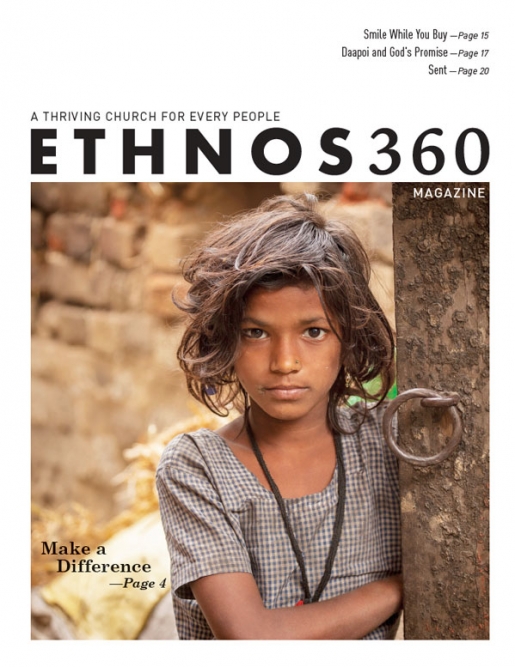YOU Can Make a Difference
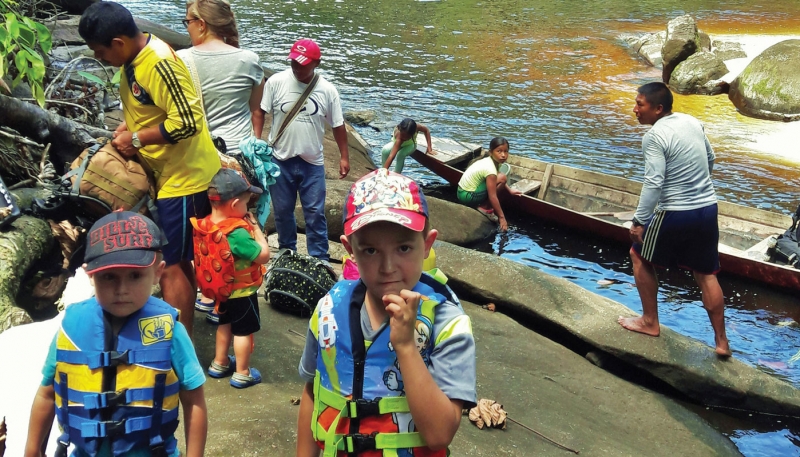
The last two issues of this magazine have beautifully focused primarily on the role of the local church in the care and maintenance of missionaries. As we continue to focus on the local church and missions, the question naturally arises: What makes up a church?
Obviously, it is individuals and families. Often these individuals (or families) take it upon themselves to invest themselves into the lives of missionaries in conjunction with the church.
We know from personal experience that many of you have been supporting family members for years — with finances, with prayers, with visits and with little special acts of kindness. A simple “thank you” seems too insignificant, but we do want to say it publicly and loudly.
And we want to honor the hard work of so many by sharing a few stories that have stirred our hearts.
Here are three examples of individuals who stepped out in faith to bless their friends, those missionaries sent out from their churches who needed something that they felt the Lord wanted them to provide. Superhumans? Mega-powerful? No, indeed. These are normal humans with a God-given desire to meet needs and bless others.
A Mechanic's Heart
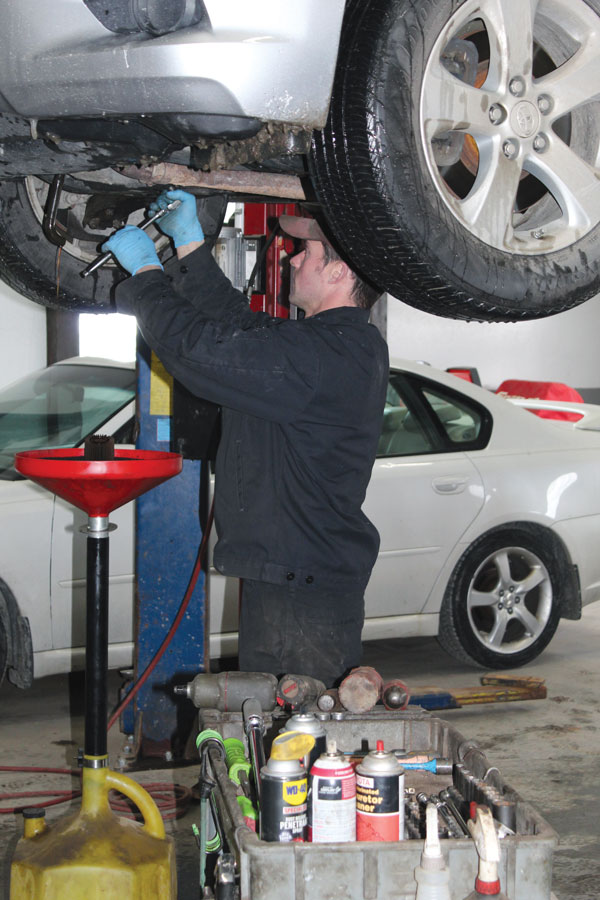
Let’s begin with a couple who had a heart to help Jared and Leah Haynes. The Haynes, who minister among the Sanapaná people group of Paraguay, were sent out by South New Milford Baptist Church of New Milford, Pennsylvania. The senior pastor is Ray Mitchell, and the outreach pastor is Kevin Radford.
Erick and Kelly Stone are that couple. I’ll let Jared tell the story of the Stones’ ministry to them.
When Jared returned home at one point, he said, “My friend Erick approached me and said that he had left his job at a Toyota dealership (he was one of their top mechanics) to open his own shop in our town (population: a little over 800). He was nervous about it and asked me to pray about an idea that he had.
“He wanted to start a missionary vehicle program for missionaries that are sent overseas by our home church. I was thinking this was a 10-year pipe dream. When we went on furlough just a year later, we learned that Erick had presented this idea to the church, and they began taking donations. [According to the Stones, within a month, they had received $18,000.] By the time we got to the USA, we had a van with two car seats; later, the church reimbursed us for the insurance and paperwork as well.
“Erick did all of the car maintenance. I think we drove over 20,000 miles, and each oil change, inspection or flat tire was done completely for free for us. [Erick donates the labor and purchases the parts with money from the Missionary Vehicle Fund.]
“Fast forward two months after we returned to the field from home assignment. We found a golf ball-sized tumor on our daughter’s left arm. We turned around and went back to the USA. Erick hadn’t had time to sell the van yet. Once he heard we were coming, he had the van up and running for us just a day before our arrival. He took us to get all the paperwork and insurance done as soon as we were ready. That was time away from his garage where he could have been making money.
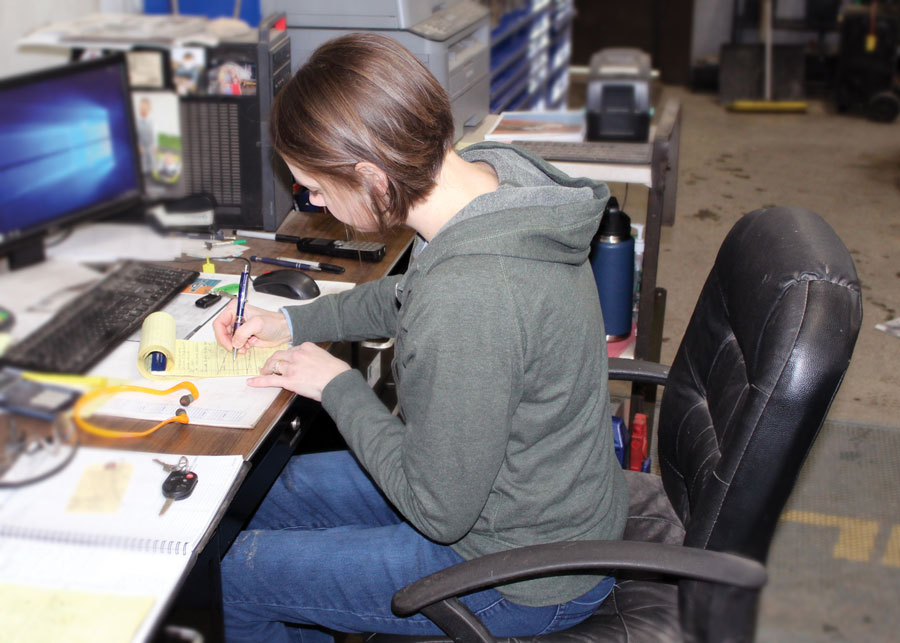
“They truly see themselves as reaching other people through our ministry. We’re always amazed at their sacrifice and willingness to ‘serve as senders.’
“Each time they’ve handed us keys, they’ve looked us in the eye and said, ‘Here are our numbers. Call any time, seriously. I don’t care if it is car-related or not — call me and we’ll be there to help you. Even if you just need to talk
to someone.’ ”
The Stones Speak
I had the opportunity to talk with the Stones to get their side of the story.
Bruce: How did God direct you into this ministry?
Stones: We had three sets of missionary friends that were all getting ready to leave for the mission field in foreign countries. We watched them sell and give away just about everything that they owned to leave and serve God. We had been praying for a way that we could use our talents to serve the Lord. Since Erick is an automotive technician, we thought that we could somehow use his skills as a way to help the missionaries. We watched how hard it was for missionaries to come home on home assignment and purchase a vehicle to drive for a few months and then try to sell it and get the money back out of it before they left. We didn't want the missionaries to worry about purchasing or getting a car, about repairs or regular maintenance, or about getting rid of the vehicle when they left.
Bruce: How did you even get the ministry off the ground?
Stones: We had an idea, and we were willing to act upon it. God did the rest. We thought and prayed about this for years. We wanted to be able to provide a vehicle for our missionaries on home assignment at no cost to them. However, we had none of the resources for accomplishing this. We did not have a facility, enough money, nor time for Erick to do what was needed on these vehicles. We could get a better price on a vehicle that needed an engine, transmission or larger repair job that Erick could put labor into for free. However, Erick was employed full-time at a car dealership, and we did not see how this ministry would ever be possible.
It was never our dream to start our own automotive repair business. [But] the only feasible option seemed to be to purchase our own building. If we owned our own automotive repair facility, we would have the building and Erick's time to be able to prep and repair these vehicles.
One year before two of our missionary families were to be on home assignment, there was a building that could be used for auto repair about five minutes from our house. We decided to make an offer on it, and then we could say, "Well, we tried," [if we got turned down.] The offer was accepted, and we then had to start a business. We wanted to have this ministry, but we also needed to pay our bills and put food on the table, … and Kelly was eight and a half months pregnant with our third son! To us, this seemed like the worst possible time to be buying a building, switching jobs and starting a business, but God had it all worked out. Two months later, Erick left a stable job in the dealership to start our own auto repair business.
We had the facility, and Erick could manage his time to be able to do this ministry, but we still didn't have the funds to purchase vehicles for the ministry. Six months before the missionaries were to be on home assignment, we proposed our ideas for the "Missionary Vehicle Ministry" to the pastor of our church, then to the deacon board, and then to the trustees. They were all in favor of the idea and told us to present it to the church. We found out that God's people want to help, and they want to give. Sometimes they just need an opportunity to do it, and this ministry gave them that chance. Our church family loves our missionaries, and they were excited to give. With their generosity, the ministry was completely funded in time for us to purchase and prep two vans for our missionaries on home assignment.
Bruce: What a testimony! Now, what makes your ministry different?
Stones: The purpose of this ministry is to provide vehicles for [the missionaries that our church has sent out] while they are on home assignment at no expense to the missionaries, including the maintenance and repairs. We help with the title and insurance as soon as they get home and the day that they leave. We then sell the vehicle and put the money back into the fund, so it is available for the next missionary that is on home assignment. This allows us to be able to purchase a used but newer vehicle each time they come home. We want the missionaries to be able to focus on their work and not have to worry about their car.
Bruce: What obstacles did you have to overcome in order to put your dreams into practice? How has this ministry encouraged your heart for missions?
Stones: The obstacles were big: a facility, time for Erick to be able to work on the vehicles, and money. It was a real test of faith when Erick left his stable job to start a business from scratch in order to start a vehicle ministry. It was a huge encouragement for us to see God's people give their money and support. We were encouraged, as we tried to encourage our missionaries!
Bruce: How would you encourage others to do something similar? How would you challenge them to take that step of faith?
Stones: We are just normal people, [but we] wanted God to use us and the abilities that He has given us to serve Him. We prayed that He would. We thought of an idea and acted upon it. We asked and needed other people to help.
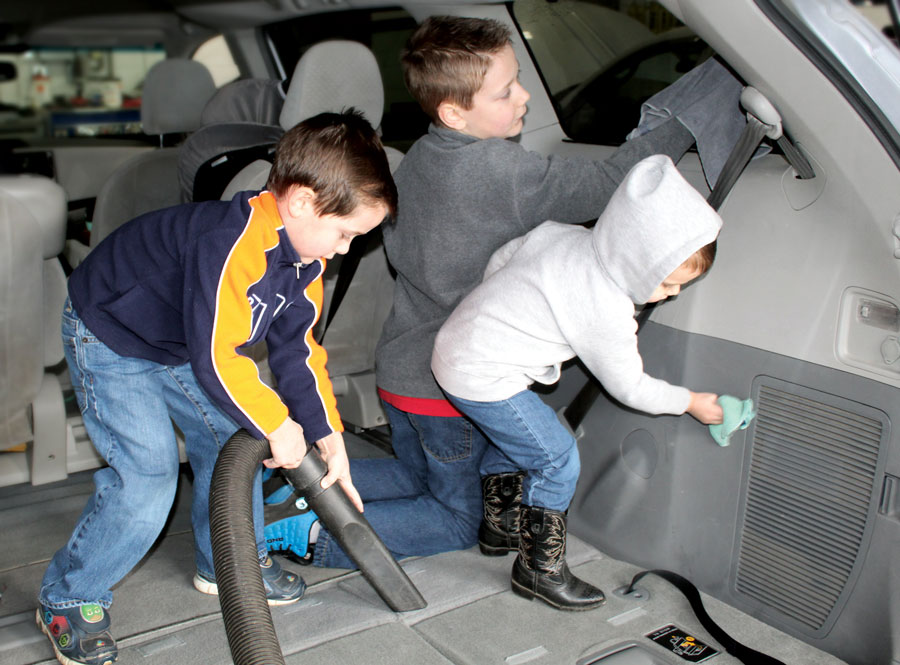
Bruce: What has been the biggest blessing you have received as a result of this ministry?
Stones: Seeing the missionaries who are exhausted from traveling not have to worry about transportation. Handing them the keys to a clean, reliable vehicle that is all set to go and watching the relief on their faces. Watching excited missionary kids climb into the van, as some of them only travel by canoe! It's a blessing to get to visit with the missionaries at our garage during repairs or maintenance. They are always such an encouragement to us.
Seeing God work out the details of an idea that we thought was impossible was a blessing. Looking back at how it all came together, God showed us His guidance and how He can use anyone in any position to accomplish His work. The only way it all worked out is because God wanted it to.
Bruce: It makes my heart sing when I read about how “ordinary people” do incredible things when they allow God to direct them, their skills, their pocketbook and their time.
It Takes a Team
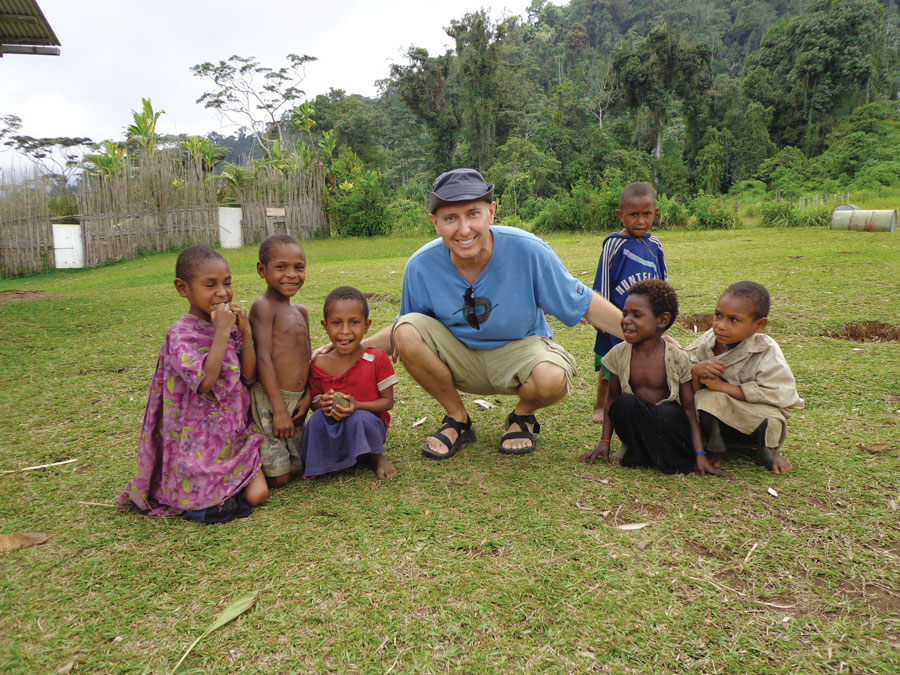
Geoff and Shannon Husa minister among the Mibu people group in Papua New Guinea. They were originally sent out by Bethany Community Church which has since merged into Sun Valley Community Church. There is what Geoff calls their “core team” that has been of incredible support to them and to the ministry among the Mibus. Geoff explained like this:
“We’ve been really blessed over the years by our ‘core team.’ This was a team of people put together at the very beginning of our ministry who gather together once every one to two months to pray over recent ministry events and requests, who connect with us regularly and who put together fundraisers a couple times a year. They’re not from any one church, but [it is] a group of supporters representing several local churches in the Tempe/Chandler area of Arizona.
“Our core team has been a consistent connection with our sending base from day one.”
I was able to talk with Kevin Kramar, the core team’s leader about the “core team” concept.
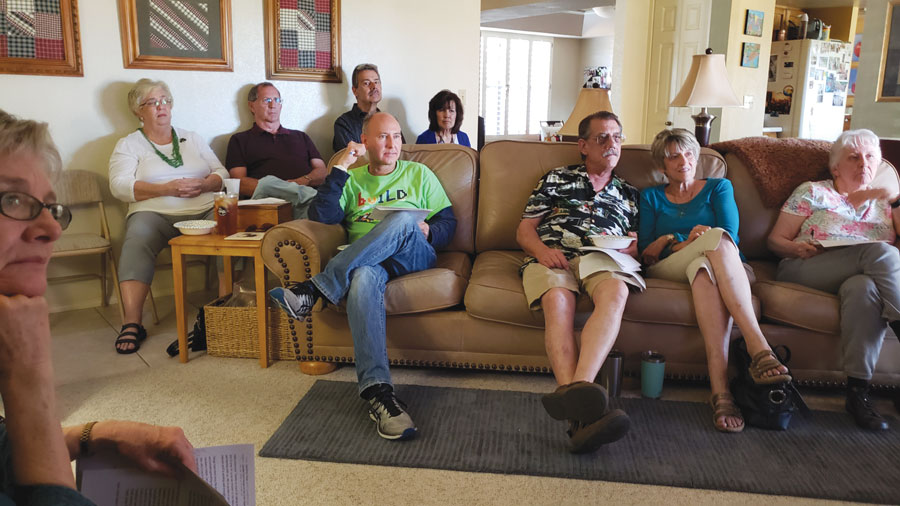 The Core Team in Action
The Core Team in Action
Bruce: When did you meet the Husas?
Kevin: In the late 1990s we attended the same church, Bethany Community Church, in Tempe, Arizona. Bethany Community Church was a local church coming together as a 'community.' We became a 'sending church' when we sent out some of those among us to the mission field abroad. One of those young couples was Geoff and Shannon Husa. The Husas would continue to receive the strong support of their home church through our giving and our prayer.
Bruce: How did you decide to form the core team?
Kevin: I did not create the core team but am just one of many people who love the Husas and want to help support the incredible work God is doing through them. The area God has called the Husas to live and serve is extremely remote and can seem like quite an isolated way of life. It is important to the core team that the Husas know there are others who are “with them” in their work there. We support them through our regular prayer and communication, our ongoing fundraising support, and [meeting] occasional needs during their home visits and home assignments.
Bruce: Who is involved in the core team? I understand that more than one church is involved, correct? What are the names of those churches?
Kevin: The team was formed out of the community of Bethany Community Church, [and has] since … grown to include more churches. Today we have core team members from the following churches: Grace Community Church, Sun Valley Community Church, Arizona Community Church and Chaparral Christian Church.
Bruce: How do you assist/help/support the Husas?
Kevin: The core team holds meetings every other month … to catch everyone up on the Husas. We typically cover things such as short- and long-range goals within the Mibu people group, Bible translation progress, Mibu literacy program updates, status updates on the development of the local church and the appointment of elders, airstrip work status, personal health of all family members, educational updates on each of the Husa children, family financial status updates, unforeseen needs and new prayer requests.
In addition to our regular meetings, we hold two annual fundraisers: a benefit concert in the spring and a two-day community garage sale in late fall. For the concert fundraiser, we network to find local talent who will donate their time and talent through a backyard concert. We collect donations for a silent auction beforehand. The day of the concert, our guests bring a chair and a snack to share. We set everything up in a backyard (actually Geoff's parents' home) when the weather is nice, put out the endless buffet of snacks and open a silent auction for all. The concert is free though we have a donation bin set up. We share about the Husas and the work they are doing during a short intermission.
For the garage sale, we also rely heavily on donations. Many people hold onto their donations [for] our sale each year. Every dollar collected is pure profit, and it adds up quickly.
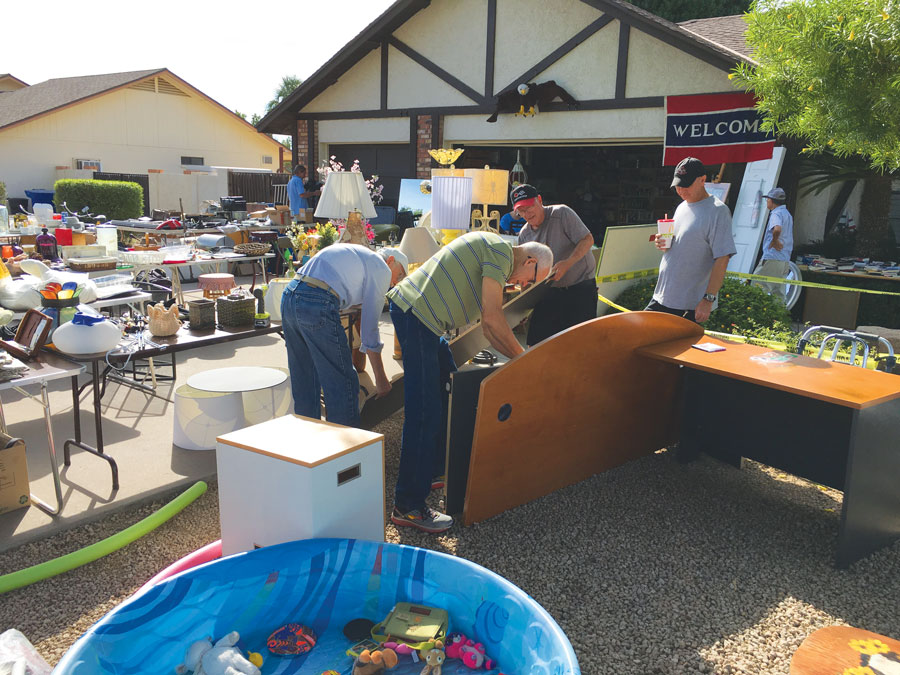
Bruce: Have you gone to visit the Husas?
Kevin: Yes, I have been there twice. Several of us have.
I believe visits to the field are important for three reasons. First, it helps individuals back home connect with the work that is being done in the people group; you get to meet the individuals you're praying for, see the real setting and witness the actual work in progress.
Second, you can form a customized team of individuals who can help with a significant project in a relatively short timeframe. The core team has been involved with house building and expansions, airstrip work and helping put on a … regional conference for Papua New Guinea missionary families.
Third, visiting the family in their mission setting is a true blessing to each of those family members. It brings a “touch of home” to their everyday life on the mission field, and they love to share their “mission life” in person with others from back home.
Bruce: Does the team take care of any other missionaries?
Kevin: Our team specifically and solely supports the Husas. Some of our team members may be involved with other core teams, but all our efforts as the Husa Core Team fully support Geoff and Shannon Husa and family in Papua New Guinea.
Bruce: What advice do you have for others desiring to form a core team?
Kevin: A team can begin with just a few people and grow from there. [Consider] those who already support the missionary work through financial gifts and/or prayer. Approach individuals who were involved in the original send-off — remember those who are on staff at the sending church, too. The idea of serving on a core team is often very exciting for those who are already involved in some way. Share the excitement by personally inviting individuals to join the team rather than [through] an announcement from the pulpit or a blurb in the church bulletin.
Find a place to meet. Not everyone on the team will make all the meetings. Don't get discouraged by that. Keep communication strong through emails and keep the meetings consistent. We send out meeting minute updates to the entire team after every meeting … to keep everyone in the loop which makes it easy for members to join us at any core team meeting, even when they may have missed a few of our recent gatherings.
Mi Casa Es Su Casa
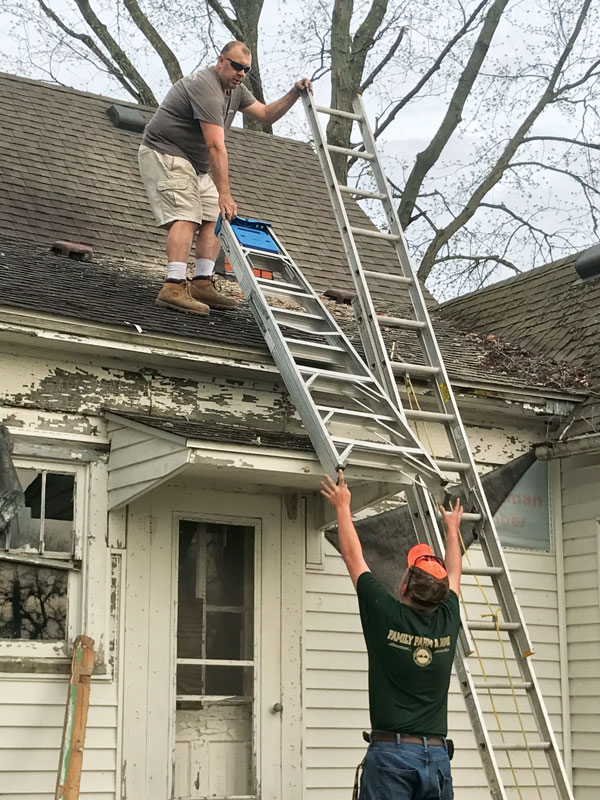
And then there is the family of the facility maintenance manager at the Ethnos360 Aviation home office in McNeal, Arizona: Kent and Brenda Rockwell. The Rockwells were sent out as missionaries from Hope Missionary Church in Bluffton, Indiana, with Gary Aupperle as the pastor. One family within that congregation has blessed the Rockwells richly. Their names are Tim and Julie Eicher. They began a missionary housing ministry in 2015.
Kent said, “Tim and Julie, their son (Ian) and daughter (Kaylee) have started a ministry called Eicher House Ministries. They provide homes for missionaries on home assignment (or even while in training) rent free. It is a tremendous service that allows missionaries their own home so they don’t have to live in a stressed environment of sharing a home with someone or making rent payments that could be spent on other necessities.
“We have greatly benefited from this ministry, as have other Ethnos360 missionaries. The whole Eicher family is involved, and it has significantly improved many missionaries lives as they transition to the field or need a great place to stay on a home assignment. Tim and Julie repair any problems, and Ian mows the yard, among many other tasks. Kaylee jumps in and helps where she can as well.”
To me, that sounds like an incredibly expensive enterprise. I asked the Eichers about their ministry and how they viewed it.
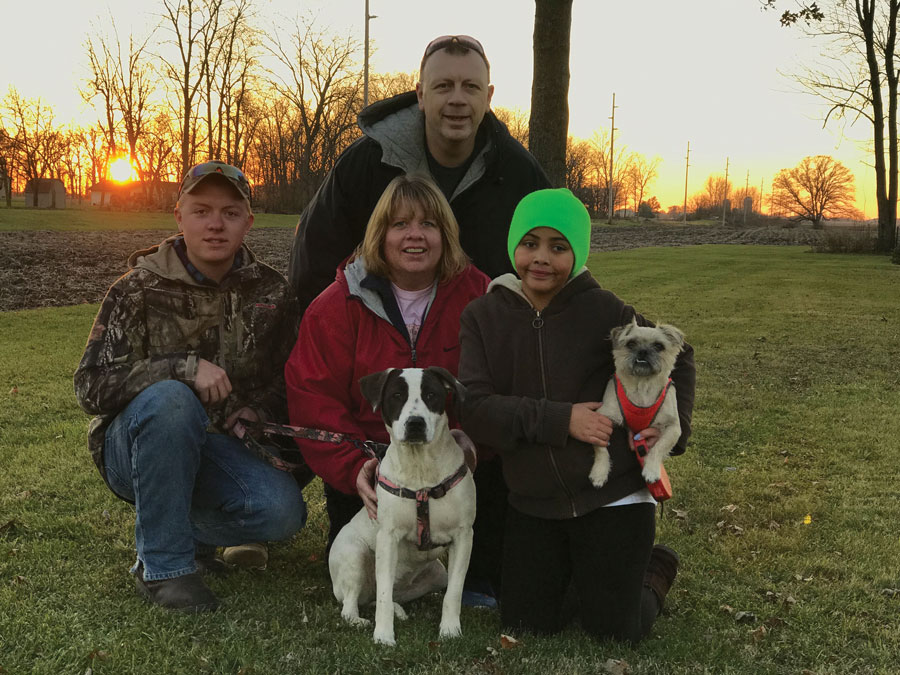
Eicher House Ministries
Bruce: What prompted you to start this ministry?
Eichers: We were praying about going into missions and felt that we were not to go overseas but to do something at home for missionaries. That is when we had the vision of housing missionaries when they come home or during training.
Bruce: What barriers did you have to overcome to get it going?
Eichers: Finances: we sold our home so we could buy two smaller homes — one for us to live in and one to use for missionaries. Since then, we have purchased two [other] homes that were in disrepair and are working on re-doing these homes so we can offer more to missionaries. Tim works overtime every week to ensure we have enough money to pay for the houses.
Bruce: Have you received any blessings as a result of starting this ministry?
Eichers: We have been blessed by getting to meet different missionary families as they inquire about staying in our houses. Recently our church did a year-end project, and we were included, so we will be receiving finances to help with the renovating of the two houses. We have also been blessed by people donating items for the houses.
Bruce: How would you challenge others to do something similar?
Eichers: When [missionaries] come home [to the USA], they need a place on their own. They need to re-adjust to America on their own schedule. Being able to offer housing that is completely furnished so they don’t have to worry about anything when they come back is the blessing we offer. It is how we can be a part of the mission work they are doing, [part of a] support team, if you will. If you don’t feel the calling to go overseas, then help at home by offering this to missionaries.
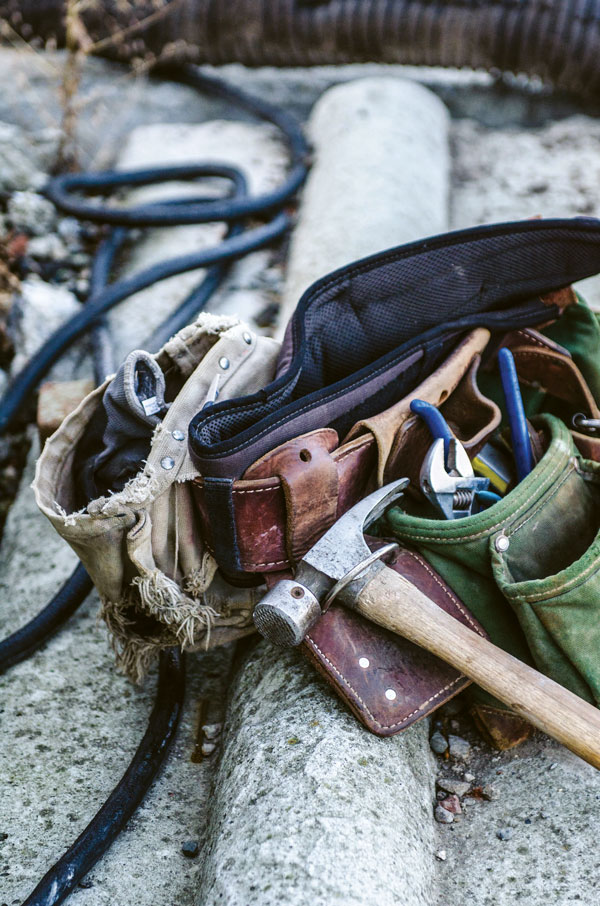
What About You?
Three groups of individuals who believed God wanted them to bless others … hmm, nothing supernatural about what they did, right? God took the skills and abilities that these “normal humans” had and used them to nurture, to bless, to care for and to encourage missionaries around the world.
Obviously, I don’t have enough room to recount all the stories of how different ones of you have been used by God to bless missionaries. I received quite a few missionaries’ stories with your names and how you have blessed beyond measure different ones on or off the foreign field.
But maybe — just maybe — someone reading this has had an idea of how to form a Core Team or how to begin a business with the sole purpose of using it to further a missionary’s ministry or how to be creative in being a blessing. Go. Do. Take that step of faith and watch God work.

